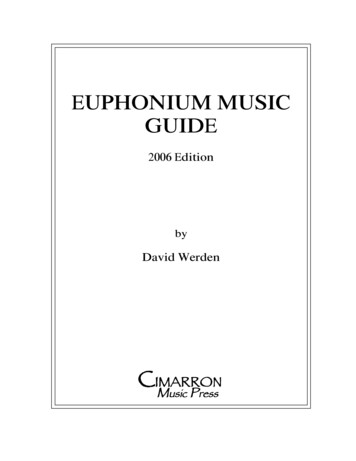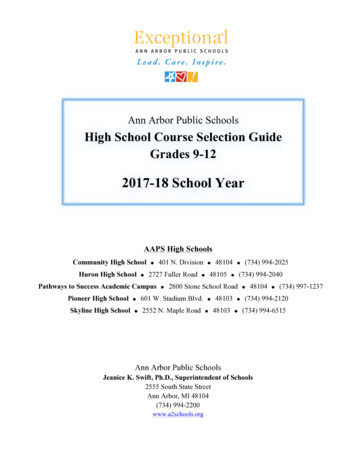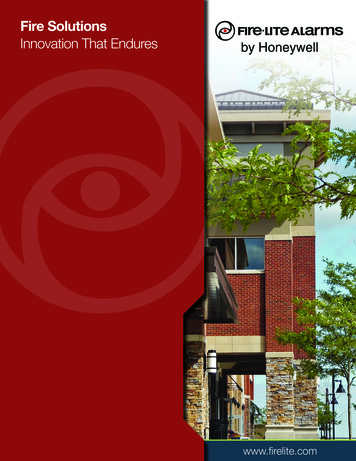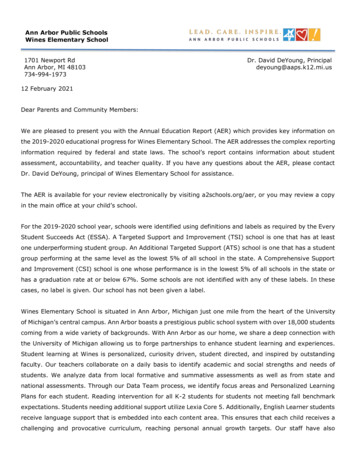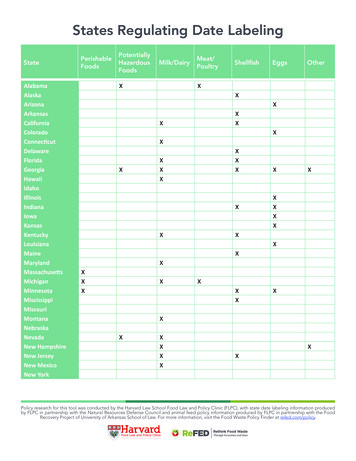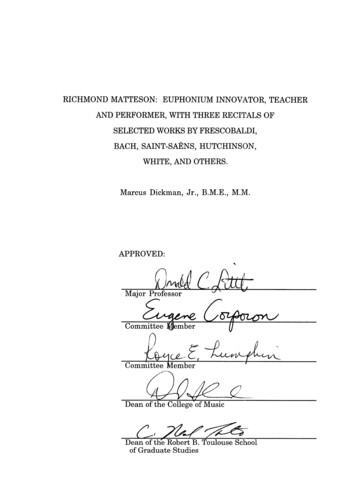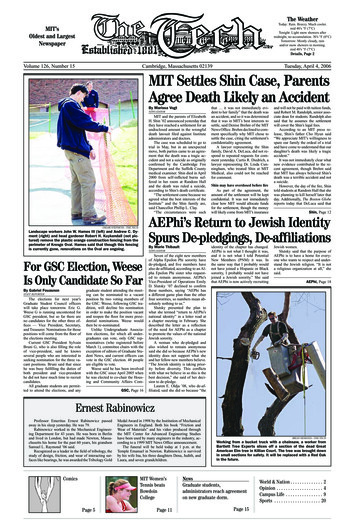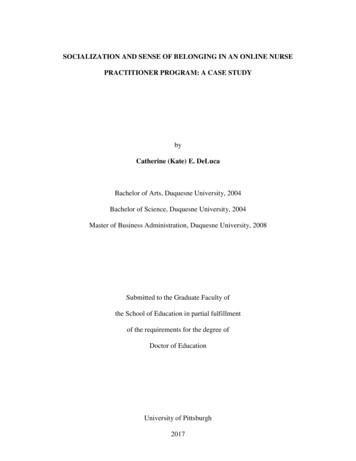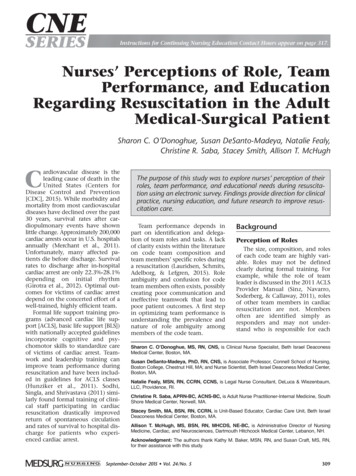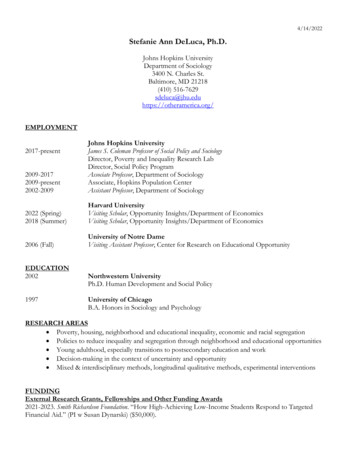
Transcription
4/14/2022Stefanie Ann DeLuca, Ph.D.Johns Hopkins UniversityDepartment of Sociology3400 N. Charles St.Baltimore, MD 21218(410) PLOYMENT2009-20172009-present2002-2009Johns Hopkins UniversityJames S. Coleman Professor of Social Policy and SociologyDirector, Poverty and Inequality Research LabDirector, Social Policy ProgramAssociate Professor, Department of SociologyAssociate, Hopkins Population CenterAssistant Professor, Department of Sociology2022 (Spring)2018 (Summer)Harvard UniversityVisiting Scholar, Opportunity Insights/Department of EconomicsVisiting Scholar, Opportunity Insights/Department of Economics2006 (Fall)University of Notre DameVisiting Assistant Professor, Center for Research on Educational rn UniversityPh.D. Human Development and Social PolicyUniversity of ChicagoB.A. Honors in Sociology and PsychologyRESEARCH AREAS Poverty, housing, neighborhood and educational inequality, economic and racial segregation Policies to reduce inequality and segregation through neighborhood and educational opportunities Young adulthood, especially transitions to postsecondary education and work Decision-making in the context of uncertainty and opportunity Mixed & interdisciplinary methods, longitudinal qualitative methods, experimental interventionsFUNDINGExternal Research Grants, Fellowships and Other Funding Awards2021-2023. Smith Richardson Foundation. “How High-Achieving Low-Income Students Respond to TargetedFinancial Aid.” (PI w Susan Dynarski) ( 50,000).
2020-2024. Bill and Melinda Gates Foundation. “Seattle Housing Authority Mobility from Poverty Pilot.” (PI,partnership with Seattle and King County Housing Authorities) ( 543,361).2020-2021. University of Michigan, Poverty Solutions. “College Decision-Making and Financial Aid.” (Co-PI w SusanDynarski) ( 20,000).2019-2021. Overdeck Family Foundation. “Creating Moves to Opportunity: Understanding Experimental Outcomesthrough Family Experiences.” (PI, Sub-Award from Opportunity Insights/Harvard University) ( 345,280).2019-2022. Russell Sage Foundation. “Rational Responses to Uncertainty: Understanding Disadvantaged Youths’Post-Secondary Education Choices.” (Co-PI w Nicholas Papageorge) ( 171,182).2019-2020. William T. Grant Foundation. “Creating Moves to Opportunity for Families and Children: Using MixedMethods to Understand Policy Mechanisms.” (PI) ( 49,077).2018-2019. Annie E. Casey Foundation/Poverty and Race Research Action Council. “Tempting the OpportunityLandlord: What Convinces Landlords to Accept Voucher Holders in Low-Poverty Areas?” (PI) ( 20,000).2016-2020. Annie E. Casey Foundation. “Who Is Moving In? Repopulation, Reinvestment, and Pathways toRevitalization in East Baltimore and Greater Homewood” (Co-PI w Kathryn Edin, Philip Garboden, ChristineJang) ( 539,429).2016-2021. Bill and Melinda Gates Foundation. “Mobility from Poverty: A Pilot Intervention in Seattle and KingCounty.” (Co-PI w Raj Chetty, Lawrence Katz, Nathan Hendren, Peter Bergman, Christopher Palmer, SeattleHousing Authority, King County Housing Authority) ( 3M, all direct costs for intervention).2015-2018. MacArthur Foundation. “How Parents House Kids and How Landlords Broker the Geography ofOpportunity.” (Co-PI w Kathryn Edin) ( 100,000).2015-2019. Spencer Foundation. “Switching Schools and Navigating Neighborhoods: Can Housing VouchersImprove Educational Achievement for Low Income Minority Youth?” (PI) ( 292,000).2015-2016. The Annie E. Casey Foundation. “Hearing Their Voices: Baltimore Youth’s Perceptions After FreddieGray.” (Co-PI w Kathryn Edin) ( 79,000).2014-2016. The Annie E. Casey Foundation. “Divestment and Abandonment in Baltimore, MD.” (Co-PI w KathrynEdin) ( 99,000).2014-2015. United States Department of Housing and Urban Development. “Moving to Opportunity: Platform forImproving Health.” (Co-PI w Craig. Pollack and Rachel Thornton) ( 76,000).2013-2017. United States Department of Housing and Urban Development. “Brokering the Geography of Opportunity:How Landlords Affect Access to Housing and Neighborhood Quality Among HUD Assisted Renters.” (Co-PIw Kathryn Edin) ( 401,000).2013-2014. Furman Center for Real Estate and Urban Policy, New York University. “The Gatekeepers of Geography,How Landlords Affect Access to Housing and Neighborhood Opportunity Among Moderate- to Low-IncomeRenters.” (Co-PI w Kathryn Edin) ( 25,000).2012-2020. The Century Foundation. Fellow.2012-2015. United States Department of Housing and Urban Development. “The Interface of Mobility and Sustainability:
Thompson v HUD.” (Co-PI w AREA, Inc.; The Urban Institute).2012-2018. The Annie E. Casey Foundation. “How Parents House Kids: Residential Decisions, Financial Tradeoffsand Parenting Among Low to Moderate Income Families with Young Children”. (Co-PI w Kathryn Edin)( 750,000).2012-2015. Abell Foundation. “Connecting Housing and Education Policy: Examining Educational Outcomes forthe Children of the Baltimore Mobility Program”. (PI) ( 197,000).2011-2014. MacArthur Foundation. Research Network on Housing and Families with Children (Member).2011-2013. National Science Foundation. “Creating School Choice through Housing Choice: How IncreasedHousing Opportunity Affects Educational Access for Poor Children.” (PI) ( 220,000).2011-2012. Abell Foundation. “Do Place-Based Policy Interventions Increase Neighborhood Opportunity? TheCase of Sandtown-Winchester in Baltimore”. (PI) ( 31,300).2010-2012. William T. Grant Foundation. “Low-Income Youth, Neighborhoods, and Housing Mobility inBaltimore” (Co-PI w Kathryn Edin and Susan Clampet-Lundquist) ( 460,938).2008-2013. William T. Grant Foundation Scholars Award. “Moving Matters: Residential Mobility, Neighborhoodsand Family in the Lives of Poor Adolescents.” (PI) ( 350,000).2008. Spencer Foundation. Resident Fellowship, Summer 2008.2008-2009. Spencer Foundation. “Should Everyone Go to College? Reconsidering the Risks and Rewards ofPostsecondary Education in the United States” (Co-PIs w E. Grodsky, R. Warren, R Deil-Amen) ( 11,000).2008. Spencer Foundation. “Reconsidering College Enrollment for All: Exploring Multiple Pathways to SuccessfulAdulthood” (Co-PIs w E. Grodsky, R. Warren, R. Deil-Amen) ( 11,000).2008-2009. Annie E. Casey Foundation. “Residential Mobility and Opportunity: Following the Families ofBaltimore's Thompson Housing Voucher Program” (PI) ( 25,000).2008-2009. Spencer Foundation. “Soft and Hard Skill Sets: Measuring Readiness in Young Adulthood withCognitive Skills and Noncognitive Traits” (PI) ( 40,000).2008-2009. American Educational Research Association Grants Program. “The Decision Not to Attend College: School,Work and Opportunities in the Lives of Contemporary High School Students” (Co-PI w Robert Bozick)( 20,000).2007-2008. Annie E. Casey Foundation. “Residential Mobility and Opportunity: Following the Families ofBaltimore's Thompson Housing Voucher Program” (PI) ( 57,000).2006. Center for Research on Education Opportunity, University of Notre Dame. Visiting Faculty Fellowship.2005-2006. National Academy of Education/Spencer Foundation. Postdoctoral Fellowship. “Coming and Going: TheNeighborhood and Educational Contexts of Mobile Students.” (PI) ( 55,000).2003-2005. National Center for Career and Technical Education, Office of Vocational Education, United States Department ofEducation. “Opportunity, Exposure, and Outcomes: Analyses of the Career and Technical Educational
Experiences of National Longitudinal Survey of Youth 1997 (NLSY97) Participants.” (Co-PI w Stephen Plank)( 144,000).2003-2005. Annie E. Casey Foundation. Graduate research suppport for foundation research priorities (PI)( 20,000).Other Funding Awards and Internal Research Grants2019-2020. Johns Hopkins University, Internal Research Award. “What Happens When an Elite University AnnouncesIt Is Need-Blind? Attracting, Retaining and Advancing Economically Disadvantaged Students.” (co-PI with NickPapageorge) ( 100,000).2017-2018. Johns Hopkins University, 21st Century Cities Initiative Seed Grant Program. “How Information and FutureExpectations Affect Educational Investments among Low-Income Youth in Baltimore.” (co-PI with NickPapageorge and Seth Gershenson) ( 25,000).2017. Undergraduate Summer Training and Research Program (STAR), Johns Hopkins, for Jillian Pak2016-2017. Robert Wood Johnson Foundation. “The Effects of Neighborhood Poverty on Health Care Utilizationand Spending for Low-income Adults and Children: Linking the Moving to Opportunity Participants to MedicalClaims Data.” (PI Craig Pollack) (total: 132K; 5% effort).2016-2023. National Institute of Environmental Health Sciences. “The effect of a housing mobility program onenvironmental exposures and asthma morbidity among low-income minority children.” (PIs Craig Pollack andElizabeth Matsui) ( 3M total costs; 5% effort).2013. Hopkins Population Center. “Comparative effectiveness of moving to a low- versus remaining in a highpoverty neighborhood for health care utilization and costs.” (Co-PI with Craig Pollack and Rachel Thornton,JHU School of Medicine). ( 25,000).2011. Hopkins Population Center. “Understanding Family Instability in the Lives of Poor Youth” ( 15,000).2009. Provost Undergraduate Research Award Grant, Johns Hopkins University2009. Center for Educational Resources Technology Fellows Grant, Johns Hopkins University2003. Kreiger School of Arts and Sciences Dean’s Incentive Grant for Junior Faculty, Johns Hopkins UniversityBOOKSDeLuca, Stefanie, Susan Clampet-Lundquist and Kathryn Edin. 2016. Coming of Age in the Other America. NewYork: Russell Sage Foundation. William J. Goode Book Award, American Sociological Association Selected as an Outstanding Academic Title by the American Library Association Reviewed in American Journal of Sociology, Contemporary Sociology, City and Community, Journal of EconomicLiterature, Social Service Review, Journal of the American Academy of Adolescent and Child Psychiatry, Journal ofYouth and Adolescence, Education Next, Journal of Housing and the Built Environment, Journal of AffordableHousing and Community Development Featured in New York Times, The Atlantic, Washington Post, The Nation, New York Post, Next City,Baltimore Sun, The 74, Fusion, Trace, NPR, WYPR Baltimore, KPFK Los Angeles, BBC Australia, PBSPAPERS(graduate student co-authors underlined; postdoctoral & junior faculty co-authors noted by *; alpha order noted)Journal ArticlesDeLuca, Stefanie, Nicholas Papageorge, Joseph Boselovic and Jasmine Sausedo. 2024 (tentative). “’I might noteven make it to the future’: Negative Shocks and Post-Secondary Decision-Making Among DisadvantagedAfrican-American Youth.” RSF: The Russell Sage Foundation Journal of the Social Sciences.
DeLuca, Stefanie, Lawrence S. Katz and Sarah Oppenheimer.* 2023 (tentative). “‘When Someone Cares AboutYou, It’s Priceless’: Reducing Administrative Burdens and Boosting Confidence in the Creating Moves toOpportunity Experiment.” RSF: The Russell Sage Foundation Journal of the Social Sciences.DeLuca, Stefanie and Eva Rosen.* 2022. “Housing Insecurity Among the Poor Today.” Annual Review of Sociology.Pollack, Craig, Debra G. Bozzi, Amanda L. Blackford, Stefanie DeLuca, Rachel Thornton, Bradley Herring.Forthcoming. 2021. “Using the Moving to Opportunity Experiment to Investigate the Long-Term Impact ofNeighborhoods on Healthcare Use by Specific Clinical Conditions and Type of Service.” Housing Policy Debate.DeLuca, Stefanie and Christine Jang-Trettien. 2020. “‘Not Just a Lateral Move’: Residential Decisions and theReproduction of Urban Inequality.” City and Community 19(3): 451-488.Pollack Craig, Blackford Amanda, Du Shawn, DeLuca Stefanie, Thornton Rachel, Herring Brad. 2019.“Association of receipt of a housing voucher with subsequent hospital utilization and spending.” Journal of theAmerican Medical Association 322: 2215-2124.Harvey, Hope, Kelley Fong, Kathryn Edin and Stefanie DeLuca. 2019. “Forever Homes and Temporary Stops:How Housing Search Perceptions Shape Residential Selection.” Social Forces 98: 1498-1523.DeLuca, Stefanie, Holly Wood and Peter Rosenblatt.* 2019. “Why Poor People Move (and Where They Go):Reactive Mobility and Residential Decisions.” City and Community 18:556-593.DeLuca, Stefanie. 2019. “Residential Mobility and Neighborhood Change in Chicago.” Housing Policy Debate. 29:213-216.Garboden, Philip, Eva Rosen*, Stefanie DeLuca and Kathryn Edin. 2018. “Taking Stock: What Drives LandlordParticipation in the Housing Choice Voucher Program.” Housing Policy Debate 28:979-1003.DeLuca, Stefanie and Peter Rosenblatt.* 2017. “Walking Away from The Wire: Housing Mobility andNeighborhood Opportunity in Baltimore.” Housing Policy Debate 27: 519-546.Holland, Megan* and Stefanie DeLuca. 2016. “Why Wait Years to Become Something? Low Income AfricanAmerican Youth and the Costly Search for Careers in For-Profit Programs.” Sociology of Education 89: 261-278.Rosenblatt, Peter* and Stefanie DeLuca. 2015. “What Happened in Sandtown-Winchester? Understanding theImpacts of a Comprehensive Community Initiative.” Urban Affairs Review 1-32.Condliffe, Barbara, Melody Boyd* and Stefanie DeLuca. 2015. “Stuck in School: How School Choice PoliciesInteract with Social Context to Shape Inner City Students’ Educational Careers.” Teachers College Record 117: 1-36.Darrah, Jennifer* and Stefanie DeLuca. 2014. “‘Living Here Changed My Whole Perspective’: How EscapingInner City Poverty Shapes Neighborhood and Housing Choice.” Journal of Policy Analysis & Management. 33: 350384.DeLuca, Stefanie, Philip Garboden and Peter Rosenblatt*. 2013. “Segregating Shelter: How Housing PoliciesShape the Residential Locations of Low-Income Minority Families.” Annals of the American Academy of Political andSocial Science 647:268-299.Rosenblatt, Peter* and Stefanie DeLuca. 2012. “We Don’t Live Outside, We Live in Here”: Neighborhoods andResidential Mobility Decisions Among Low-income Families.” City and Community 11:254-284.
DeLuca, Stefanie. 2012. “What is the Role of Housing Policy? Considering Choice and Social Science Evidence.”Journal of Urban Affairs 34: 21-28.Edin, Kathryn, Stefanie DeLuca and Ann Owens*. 2012. “Constrained Compliance: Solving the Puzzle ofMTO’s Lease-Up Rates & Why Mobility Matters.” Cityscape: A Journal of Policy Development & Research 14: 163-178.Gasper, Joseph*, Stefanie DeLuca and Angela Estacion. 2012. “Switching High Schools: Reconsidering theRelationship between School Mobility and Dropout” American Educational Research Journal 49: 487-519.Bozick, Robert* and Stefanie DeLuca. 2011. “Not Making the Transition to College: School, Work, andOpportunities in the Lives of American Youth.” Social Science Research 40: 1249-1262.Deil-Amen, Regina and Stefanie DeLuca (alpha order). 2010. “The Underserved Third: How Our EducationalStructures Populate an Educational Underclass.” Journal of Education for Students Placed at Risk 15:27-50.Gasper, Joseph*, Stefanie DeLuca and Angela Estacion. 2010. “Coming and Going: The Effects of Residentialand School Mobility on Delinquency.” Social Science Research 39: 459-476.DeLuca, Stefanie and Peter Rosenblatt. 2010. “Does Moving to Better Neighborhoods Lead to Better SchoolingOpportunities? Parental School Choice in an Experimental Housing Voucher Program.” Teachers College Record112 (5) 1441-1489.DeLuca, Stefanie, Greg Duncan, Ruby Mendenhall* and Micere Keels*. 2010. “Gautreaux Mothers and TheirChildren: An Update.” Housing Policy Debate 20: 7-25.DeLuca, Stefanie and Elizabeth Dayton. 2009. “Switching Social Contexts: The Effects of Housing Mobility andSchool Choice Programs on Youth Outcomes.” Annual Review of Sociology 35: 457-491.Rosenbaum, James E., Stefanie DeLuca and Anita Zuberi. 2009. “When Does Residential Mobility Benefit Lowincome Families? Evidence from Recent Housing Voucher Programs.” Benefits: The Journal of Poverty and SocialJustice 17: 113-123.Plank, Stephen, Stefanie DeLuca and Angela Estacion. 2008. “High School Dropout and the Role of Career andTechnical Education: A Survival Analysis of Surviving High School.” Sociology of Education 81: 345-370.Mendenhall, Ruby*, Stefanie DeLuca and Greg Duncan. 2006. “Neighborhood Resources and EconomicMobility: Results from the Gautreaux Program” Social Science Research 35:892-923.DeLuca, Stefanie and Robert Bozick (alpha). 2005. “Better Late Than Never? Delayed Enrollment in the HighSchool to College Transition.” Social Forces 84(1): 527-550.Keels, Micere*, Greg J. Duncan, Stefanie DeLuca, Ruby Mendenhall*, and James E. Rosenbaum. 2005. “FifteenYears Later: Can Residential Mobility Programs Provide a Permanent Escape from Neighborhood Crime andPoverty?” Demography 42 (1): 51-73.DeLuca, Stefanie and James E. Rosenbaum. 2003. “If Low Income Blacks Are Given A Chance to Live in WhiteNeighborhoods, Will They Stay? Examining Mobility Patterns in a Quasi-Experimental Program withAdministrative Data.” Housing Policy Debate, 14: 305-346.Rosenbaum, James E., Lisa Reynolds and Stefanie DeLuca. 2002. "How Do Places Matter? The Geography ofOpportunity, Self-Efficacy, and a Look Inside the Black Box of Residential Mobility." Housing Studies, 17:71-82.
DeLuca, Stefanie and James E. Rosenbaum. 2001. “Individual Agency and the Life Course: Do Low SESStudents Get Less Long-Term Pay-Off for Their School Efforts?” Sociological Focus, 34, 357-376.Rosenbaum, James E., Stefanie DeLuca, Shazia R. Miller, and Kevin Roy. 1999. “Pathways into Work: Short andLong Term Effects of Personal and Institutional Ties.” Sociology of Education, 72, 179-196.Book ChaptersDeLuca, Stefanie, Anna Rhodes,* Allison Young. 2020. “How Parents and Children Adapt to NewNeighborhoods: Some Considerations for Future Housing Mobility Programs.” Chapter 8 (Pp. 187-218) inLaura Tach, Rachel Dunifon and Douglas L. Miller (Eds.), Confronting Inequality: How Policies and Practices ShapeChildren’s Opportunities. Washington, D.C.: American Psychological Association.DeLuca, Stefanie. 2019. “Why Don’t More Voucher Holders Escape Poor Neighborhoods?” In Ingrid Ellen andJustin Steil (Eds.), The Dream Revisited: Contemporary Debates About Housing, Segregation, and Opportunity. New York:Columbia University Press.Boyd, Melody L.* and Stefanie DeLuca. 2017. “Fieldwork with In-Depth Interviews: How to Get Strangers inthe City to Tell You Their Stories.” In Michael J. Oakes and Jay Kaufman (Eds.), Methods in Social Epidemiology(Wiley/Jossey-Bass).Rosenbaum, James E. and Stefanie DeLuca. (updated chapter, 2014). “Does Changing Neighborhoods ChangeLives? The Chicago Gautreaux Housing Program.” In David Grusky (Ed.), Social Stratification: Race, Class andGender in Sociological Perspective. Westview Press. Pp. 393-399.Rhodes, Anna and Stefanie DeLuca. 2014. “Residential Mobility and School Choice Among Poor Families.”Chapter 5 in Choosing Homes, Choosing Schools, Annette Lareau and Kim Goyette, (Eds.), Pp. 137-166. Russell SageFoundation: New York.DeLuca, Stefanie, Greg Duncan, Ruby Mendenhall* and Micere Keels*.2012. “The Notable and the Null: UsingMixed Methods to Understand the Diverse Impacts of Residential Mobility Programs.” Chapter 9 in MaartenVan Ham, David Manley, Nick Bailey, Ludi Simpson and Duncan Maclennan (Eds.), Neighborhood Effects Research:New Perspectives. Dordrecht: Springer. Pp. 195-223.DeLuca, Stefanie and James E. Rosenbaum. 2009. “Residential Mobility, Neighborhoods and Poverty: Resultsfrom the Chicago Gautreaux Program and the Moving to Opportunity Experiment.” In Gregory Squires andChester Hartman (Eds.), The Integration Debate: Competing Futures for American Cities. Routledge Press. Ch. 13.Rosenbaum, James E., Stefanie DeLuca and Tammy Tuck. 2005. “New Capabilities in New Places: Low-IncomeBlack Families in Suburbia.” In Xavier de Souza Briggs (Ed.), The Geography of Opportunity: Race and Housing Choicein Metropolitan America. Brookings Institution. Pp. 150-175. (Book Winner of the 2007 Paul Davidoff Award forTop Publication in Urban Planning).Other PublicationsCossyleon, Jennifer,* Philip Garboden* and Stefanie DeLuca. 2020. Recruiting Opportunity Landlords: Lessons fromLandlords in Maryland. Poverty and Race Research Action Council/Mobility Works Report.DeLuca, Stefanie, Nicholas Papageorge and Emma Kalish. 2020. “The Unequal Cost of Social Distancing.” Blogfor the Johns Hopkins University Coronavirus Resource Center. (Reprinted in InReach! Amerihealth)Pollack, Craig, Rachel Thornton and Stefanie DeLuca. 2014. “Targeting housing mobility vouchers to helpfamilies with children.” Journal of the American Medical Association, Pediatrics. (June: pp. E1-E2).
DeLuca, Stefanie, Susan Clampet-Lundquist and Kathryn Edin. 2016. “Want to improve your qualitativeresearch? Try using representative sampling and working in teams.” Contexts Magazine.DeLuca, Stefanie, Philip Garboden and Peter Rosenblatt.* 2012. “Why Don’t Vouchers Do a Better Job ofDeconcentrating Poverty? Insights from Fieldwork with Poor Families.” Poverty and Race 21: 1-2, 9.Bills, David, Stefanie DeLuca and Stephen Morgan. 2013. “Altered States of the Collective Mind: A Response toBrint.” Sociology of Education 86: 286-288.DeLuca, Stefanie. 2008. “Neighborhood Matters: Do Housing Vouchers Work?” Boston Review, Jan./Feb.Rosenbaum, James E. and Stefanie DeLuca. 2008. “What kinds of neighborhoods change lives? The ChicagoGautreaux Housing Program and Recent Mobility Programs.” Indiana Law Review 41:653-662.DeLuca, Stefanie and James Rosenbaum. 2008. “Escaping Poverty: Can Housing Vouchers Help?” Pathways: AMagazine on Poverty, Inequality and Social Policy, from the Center for the Study of Poverty and Inequality at StanfordUniversity. Winter: 29-32.DeLuca, Stefanie. 2007. “All Over the Map: Explaining Educational Outcomes in the Moving to OpportunityProgram.” Education Next Fall: 29-36.DeLuca, Stefanie. 2005. “The Continuing Relevance of the Gautreaux Program for Housing Mobility”. In PhilipTegeler, Mary Cunningham, & Margery Austin Turner (Eds.) Keeping the Promise: Preserving and Enhancing HousingMobility in the Section 8 Housing Choice Voucher Program Conference Report of the Third National Conference on HousingMobility. Washington, D.C.: Urban Institute.Keels, Micere*, Greg J. Duncan, Stefanie DeLuca, Ruby Mendenhall*, and James Rosenbaum. 2003. “HowPermanent Are Successes in Residential Relocation Programs?” Joint Center for Poverty Research Policy Briefs Vol. 5,No. 2.Rosenbaum, James E. and Stefanie DeLuca. 2000. “Is Housing Mobility the Key to Welfare Reform? Lessonsfrom Chicago’s Gautreaux Program.” Brookings Institution Center on Urban and Metropolitan Policy Survey Series.Multimedia Reports“Finding Home: Voices of the Baltimore Housing Mobility Program,” report with The Century d Research and Policy ReportsGarboden, Philip,* Eva Rosen,* Meredith Greif,* Stefanie DeLuca, Kathryn Edin. 2018. Urban Landlords and theHousing Choice Voucher Program: A Research Report. United States Department of Housing and Urban Development,Policy Development and Research Division.Bell, Monica,* Hana Clemens,* Stefanie DeLuca, Brittany Dernberger,* Kathryn Edin, and Allison Young.*2017. “Set-Up City: The Voices of Baltimore Youth After the April 2015 Unrest.” Poverty and InequalityResearch Lab Report, funded by the Annie E. Casey Foundation.DeLuca, Stefanie, Anna Rhodes* and Philip ME Garboden.* 2016. “The Power of Place: How Housing PolicyCan Boost Educational Opportunity.” Report for the Abell Foundation.
DeLuca, Stefanie and Peter Rosenblatt.* 2013. “Do Place-Based Policy Interventions Increase NeighborhoodOpportunity? The Case of Sandtown-Winchester in Baltimore.” A Report for the Abell Foundation. The AbellReport Volume 26, Number 8.DeLuca, Stefanie and Peter Rosenblatt. 2011. “Increasing Access to High Performing Schools in an AssistedHousing Voucher Program.” Report prepared for the Department of Housing and Urban Development and theDepartment of Education report, Finding Common Ground: Coordinating Housing and Education Policy to Support Racialand Economic Integration. tober2011.pdfDeLuca, Stefanie. 2006. “Cognitive Skills, Noncognitive Skills and Other Individual Determinants ofEducational Outcomes” White paper in preparation for “Advancing the Understanding of the Relationshipbetween Education and Labor Market Outcomes” sponsored by NORC and the Spencer Foundation. Chicago,IL, October 13th.DeLuca, Stefanie. 2006. “The Significance of Neighborhoods, Housing Policy and Residential Segregation forSchool Integration and Educational Outcomes” Report prepared for the American Sociological Association’sSpivack Workshop on School Desegregation. Arlington, VA, June 9-11th.DeLuca, Stefanie, Stephen Plank and Angela Estacion. 2006. Does Career and Technical Education Affect CollegeEnrollment? St. Paul, MN: National Research Center for Career and Technical Education.Papers Under Review and Working DraftsBergman, Peter, Raj Chetty, Stefanie DeLuca, Nathaniel Hendren, Lawrence F. Katz, and Christopher Palmer(alpha order). “Creating Moves to Opportunity: Experimental Evidence on Neighborhood Choice AmongHousing Voucher Recipients.” (Revise and resubmit, American Economic Review; NBER #26164)DeLuca, Stefanie, Nicholas Papageorge, Joseph L., Boselovic, Seth Gershenson, Andrew Gray, Kiara M.Nerenberg, Jasmine Sausedo, and Allison Young. 2021. “When Anything Can Happen”: Anticipated Adversityand Postsecondary Decision-Making.” NBER #29472DeLuca, Stefanie, Jennifer Darrah-Okike* and Kiara Nerenberg. “’I Just Had to Go With it Once I Got There:’Income Differences in How Parents Find Housing and Schools.” (Under review)Young, Allison and Stefanie DeLuca. “I Don’t Want to Rush Everything and End Up Where I Started:”Disadvantaged Youth, College Choice, and the Reverse Life Course. (Revise and resubmit, Social Forces)DeLuca, Stefanie, Jacqueline Groccia and Gorana Ilic. “Developing a More Comprehensive Measure of HousingInsecurity: Insights from the Residential Histories of Housing Voucher Recipients.”DeLuca, Stefanie, Jasmine Sausedo, and Robert Bozick. “Time Waits For No One: Delayed Enrollment andBachelor’s Degree Attainment."DeLuca, Stefanie and Nicholas Papageorge. “Sub-baccalaureate Swirling: Understanding the Timing andTrajectories of Community College Students and How to Increase Degree Completion.”DeLuca, Stefanie, Philip Garboden, Anna Rhodes and Xiao Yu. “Expanding the Geography of EducationalOpportunity: Can Housing Policy Improve the Achievement of Minority Youth?”DeLuca, Stefanie, Jasmine C. Sausedo, Anna Rhodes and Robert Bozick.* “Mind the Gap (Year): College Delay,Time Use and Postsecondary Pathways.”
DeLuca, Stefanie, Kiara Nerenberg, Jasmine Sausedo and Joseph Boselovic. “We Came So Close in Finding aPlace": Residential Choice, Barriers, and Tradeoffs in the Creating Moves to Opportunity Experiment.”Garboden, Philip M.E. and Stefanie DeLuca. “I Came Straight Here”: How Poor Families Search for Housing.Rhodes, Anna, Stefanie DeLuca and Rachel Butler. “Families without Borders: Understanding Child Mobilityacross Households.”Condliffe, Barbara, Siri Warkentien and Stefanie DeLuca. "Shaken Up? When and Why Family Instability Can Bea Good Thing for Children."Warkentien, Siri, Barbara Condliffe and Stefanie DeLuca. “Measuring Family Complexity in Low-IncomeAfrican American Families.”AWARDS AND HONORS Publicly Engaged Scholar Award, American Sociological Association, Community and Urban Sociology Section (2021) Sociological Research Association (Elected 2020) University of Pennsylvania Institute for Urban Research Scholar, 2019 Carnegie Foundation Fellowship, Finalist (2019) Scholar of the Year Award, National Alliance for Residents of Assisted and Affordable Housing, 2017 William F. Goode Book Award from the American Sociological Association for Coming of Age in the Other America, 2017 William T. Grant Foundation Faculty Scholars Award, 2008-2013 Alumni Excellence in Teaching Award, Johns Hopkins University (2010; also nominated 2006) Spencer Foundation, Resident Fellowship, 2008 National Academy of Education/Spencer Foundation Fellowship, 2005-2006 Phi Delta Kappa, Best Dissertation Award (Northwestern University Chapter) (2003)SELECTED CONFERENCE PRESENTATIONSDeLuca, Stefanie and Jacqueline Groccia. “Developing a More Comprehensive Measure of Housing Insecurity:Insights from the Residential Histories of Housing Voucher Recipients.” Paper to be presented at ASA, 2022.Los Angeles.DeLuca, Stefanie, Jasmine Sausedo, and Robert Bozick. “Time Waits For No One: Delayed Enrollment andBachelor’s Degree Attainment." Paper presented at PAA, 2022, Atlanta.DeLuca, Stefanie, Jasmine Sausedo, Anna Rhodes and Robert Bozick. “Constraints or Cultivation?Postsecondary Delay Motivations and Degree Attainment." Paper to be presented at AERA, 2022, San Diego.DeLuca, Stefanie. Discussant. Author Meets Critics Session for Max Besbris Upsold: Real Estate Agents, Prices andNeighborhood Inequality, University of Chicago Press. ESS, 2022, Boston.DeLuca Stefanie, Jasmine Sausedo and Joseph Boselovic ."“I Got The Voucher and I’m Still Running ThroughObstacles”: Residential Trade-Offs Under Relaxed Constraints.” ASA, 2021, virtual.DeLuca, Stefanie, Jasmine Sausedo and Joseph Boselovic. “We Came So Close in Finding a Place": ResidentialChoice, Barriers, and Tradeoffs in the Creating Moves to Opportunity Experiment.” PAA, 2021, virtual.Young, Allison and Stefanie DeLuca. “I Don’t Want to Rush Everything and End Up Where I Started”Disadvantaged Youth, College Choice, and the Reverse Life Course. ASA, 2020, virtual.
DeLuca, Stefanie, Kiara Nerenberg and Joseph Boselovic. “‘Getting Knocked Back’: How the Anticipation ofInstability Shapes Post-Secondary Decision-Making.” ASA, 2019, New York.DeLuca, Stefanie, Kiara Nerenberg and Joseph Boselovic. “I might no
"College Decision-Making and Financial Aid." (Co-PI w Susan Dynarski) ( 20,000). 2019-2021. . Office of Vocational Education, United States Department of Education. "Opportunity, Exposure, and Outcomes: Analyses of the Career and Technical Educational . Stefanie, Lawrence S. Katz and Sarah Oppenheimer .* 2023 (tentative). "'When .
